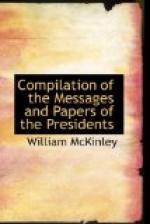VICE-PRESIDENT ROOSEVELT’S INAUGURAL ADDRESS AS VICE-PRESIDENT.
The history of free government is in large part the history of those representative legislative bodies in which, from the earliest times, free government has found its loftiest expression. They must ever hold a peculiar and exalted position in the record which tells how the great nations of the world have endeavored to achieve and preserve orderly freedom. No man can render to his fellows greater service than is rendered by him who, with fearlessness and honesty, with sanity and disinterestedness, does his life work as a member of such a body. Especially is this the case when the legislature in which the service is rendered is a vital part in the governmental machinery of one of those world powers to whose hands, in the course of the ages, is intrusted a leading part in shaping the destinies of mankind. For weal or for woe, for good or for evil, this is true of our own mighty nation. Great privileges and great powers are ours, and heavy are the responsibilities that go with these privileges and these powers. Accordingly as we do well or ill, so shall mankind in the future be raised or cast down. We belong to a young nation, already of giant strength, yet whose political strength is but a forecast of the power that is to come. We stand supreme in a continent, in a hemisphere. East and west we look across the two great oceans toward the larger world life in which, whether we will or not, we must take an ever-increasing share. And as, keen-eyed, we gaze into the coming years, duties, new and old, rise thick and fast to confront us from within and from without. There is every reason why we should face these duties with a sober appreciation alike of their importance and of their difficulty. But there is also every reason for facing them with highhearted resolution




